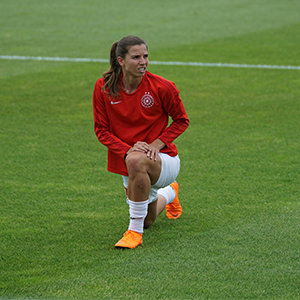Cover Photo by Jeffrey F Lin on Unsplash
Soccer is a high intensity sport, which means taking care of your body is vital. In our second part of this series, we provide tips about how to prepare yourself during pregame.
For more details or information about your physical condition, contact a sports trainer or a sports medicine specialist.
Player Wellness: Training:
https://soccerpost.com/blogs/news/player-wellness-training
Player Wellness: Postgame:
https://soccerpost.com/blogs/news/player-wellness-post-game
Player Wellness: Pregame
Pregame preparation begins before the match day. Hydrating throughout the day before is just as important as hydrating the day of your game. During your match, you will lose more fluids than during a regular practice. Drink more so you do not risk becoming dehydrated while playing. You are not only hydrating for the pregame, but you are hydrating for the entire game. Being hydrated will help you be at peak performance.
Eating a good, healthy meal before the game is very important. Food fuels your body, without it you will not have the energy you need to play. Try eating a lighter meal, something that will fill your stomach enough for the game. Make sure to give yourself time to digest before jumping into action.
Similar to practice and training, always ask yourself “Do I feel well enough to play?” A game is higher intensity than practice, so being honest with yourself is important. If there is an illness or injury that is going to slow you down during the game, it is best to pull yourself out so you can recover.
Soccer is a sport played all year round; it is important to always check the weather before playing. You want to know what conditions you will be playing in before you leave so you can dress properly. If it is cold, investing in compression undergarments to wear under the jersey is a great option. If it is warm, make sure you come with extra water and a cold towel to use when you have a break.
Warming up before the game allows your body to kick into gear. Show up at the time requested by your coach. Take your time and be intentional with your warmup. This is the time to get not only your body prepared but also your mind. Listen to your coaches when they provide warm up instructions. Warmups can include stretching every muscle group used in soccer and light activity to prepare you for the game.
Before the match begins, the referee will check to make sure you have proper cleats and shin guards. Not only do you have to be wearing these for the game, they can help be used in warm ups. Soccer is a very unpredictable sport where anything can happen. Having an extra layer of protection and properly fitted cleats and shin guards will help avoid any issues.
Seek the advice of a sports trainer or sports medicine specialist for more information, especially if you take a knock, to avoid further injury.
Postgame recovery is just as important as preparing for practice and training. In the upcoming final article in this series you will learn about postgame wellness tips.



